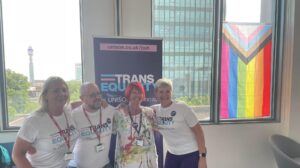UNISON’s national executive council (NEC) met today and agreed that the forthcoming NHS industrial action ballots will be its priority after hearing details plans of the work being undertaken now to build turnout.
General secretary Christina McAnea updated the meeting on bargaining, negotiations, disputes and industrial action that the union is currently engaged in, across sectors.
On health, she noted that a ballot opened in Scotland on 3 October, with phone-banking set to start this week. The ballot for England, Wales and Northern. Ireland opens on 27 October.
“These combined ballots will mean we could be balloting over 400,000 members by the end of the year. The key priority is to turn out the vote to get over 50%. This is a huge logistical challenge and requires focussing our resources on the ballots,” observed Ms McAnea.
Earlier, she had said that, while the union will be celebrating Black History Month throughout October, “we don’t just do this for one month of the year, but make sure that this is a part of our work all year”.
More widely, the general secretary said that she couldn’t remember a time when a “new prime minister and a new chancellor have been such a unifying force!” They had no mandate, she said.
“But the mask has now completely gone. They’re not even pretending to be ‘one-nation’ Conservatives any more.”
Ms McAnea said that the government’s aim was to: “Take from the poorest to give the richest”, which “gives us a lot of ammunition”.
She also told the meeting that UNISON has issued proceedings with the High Court, triggering the start of the process to seek a judicial review of the government’s “new regulations to allow the use of agency workers to break strikes”.
The general secretary’s report also updated council members on the developing Together We Rise campaign and explained that the union wants every MP to be visited by a member at the We Demand Better lobby of Parliament on 2 November, organising jointly with the TUC.
Before Ms McAnea spoke, the meeting heard a shocking report from Lesia Semeniaka (pictured above), the international officer of Atomprofspilka, the Nuclear Power and Industry Workers Union in Ukraine.
Thanking UNISON and members for their “very important” moral and financial support, Ms Semeniaka said that she was speaking on the 232nd day of a war in which “Russia is committing genocide of Ukrainian people”.
She talked of recent civilian victims of Russian attacks, together with attacks on infrastructure and on educational and cultural sites.
“According to Putin, he is waging war on all Western countries.”
Ms Semeniaka said that the Russian leader’s wider aim is clear – to deprive Western European countries of fuel in the winter, provoking people onto the streets to overthrow democratic governments.
Speaking of union members facing torture by invading forces and being used civilians as a “human shield”, she reminded the meeting that the international Red Cross is being denied access to any Russian-held Ukrainian prisoners.
No international bodies have any influence over Russians, she said, labelling Putin’s forces as “terrorists”.
The meeting also heard reports on:
- the state of pay claims and new ballots across service groups, including developments on phone banking to boost turnouts;
- developments in internal the running of elections;
- adopting 2023 as the Year of the Black Worker; and
- received and accepted the latest financial statement.
The article NEC hears that building for the NHS strike ballots is the ‘priority’ first appeared on the UNISON National site.
